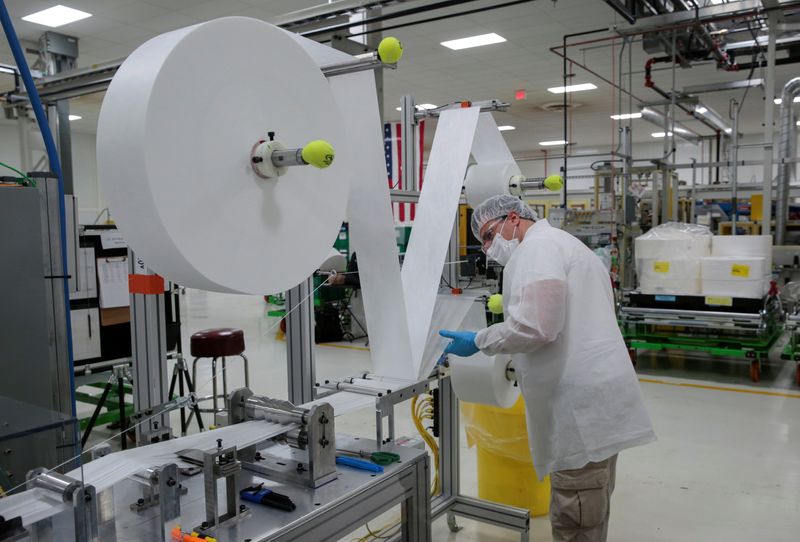By Lucia Mutikani
WASHINGTON (Reuters) - New orders for key U.S.-made capital goods increased to six-year high in September, wrapping up a quarter of potentially record growth in business spending and the economy, thanks to fiscal stimulus aimed at softening the blow from the COVID-19 pandemic.
But the report from the Commerce Department on Tuesday also showed shipments of these goods rising modestly last month, supporting expectations of slower economic activity heading into the fourth quarter. That was reinforced by a dip in consumer confidence this month. The reports came ahead of next Tuesday's fiercely contested presidential election.
A more than $3 trillion government rescue package early this year provided a lifeline for many businesses and the unemployed, helping to boost consumer spending and the housing market. But funding has dried up and new coronavirus infections are surging across the country.
"The recovery is now entering a more challenging phase, in which it will face the pandemic crisis without meaningful fiscal support," said Oren Klachkin, lead U.S. economist at Oxford Economics in New York.
Orders for non-defense capital goods excluding aircraft, a closely watched proxy for business spending plans, increased 1.0% last month to the highest level since September 2014. These so-called core capital goods orders rose 2.1% in August.
Economists polled by Reuters had forecast core capital goods orders increasing 0.5%. Though core capital goods orders have pulled above the their pre-pandemic level, they were down 0.5% year-on-year in September.
Orders last month were lifted by increased demand for primary metals, fabricated metal products and computers and electronic products. But orders for machinery and electrical equipment, appliances and components fell.
Caterpillar Inc (NYSE:CAT), a bellwether for economic activity, on Tuesday reported lower quarterly earnings, but said the pace of decline in sales of its yellow bulldozers, mining trucks and other equipment was moderating.
Separately, the Conference Board said its consumer confidence index fell to a reading of 100.9 this month from 101.3 in September amid concerns about the future. The Conference Board said "there is little to suggest that consumers foresee the economy gaining momentum in the final months of 2020, especially with COVID-19 cases on the rise and unemployment still high."
Consumer confidence is now at levels seen in October 2016. There are fears that the outcome of next Tuesday's vote could weigh on business and consumer sentiment, and undercut the recovery from the worst recession in at least 73 years.
More than four in ten supporters of both President Donald Trump and his Democratic challenger and former Vice President, Joe Biden, said they would not accept the result of the November election if their preferred candidate loses, according to a Reuters/Ipsos poll.
"Consumers are clearly worried about what tomorrow will bring as they have been hit with a second wave of the coronavirus, mounting election uncertainty as voting day grows close, and even the good news of the recovery in the stock market has gone away," said Chris Rupkey, chief economist at MUFG in New York.
U.S. stocks were trading lower. The dollar slipped against a basket of currencies. U.S. Treasury prices were higher.
SHIPMENTS SLOWING
Shipments of core capital goods gained 0.3% last month. Core capital goods shipments are used to calculate equipment spending in the government's gross domestic product measurement. They increased 1.5% in August.
The three straight months of growth in shipments likely helped to lift overall business investment from a deep hole in the third quarter. But September's small rise could be bad news for the fourth quarter.
Business investment tumbled at a record 27.2% annualized rate in the second quarter, with spending on equipment collapsing at an all-time pace of 35.9%. Investment in equipment has contracted for five straight quarters.
Growth estimates for the July-September quarter are as high as a 35.2% annualized rate, which would recoup roughly two-thirds of the output lost because of the coronavirus.
The economy contracted at a 31.4% pace in the second quarter, the deepest decline since the government started keeping records in 1947. The government is scheduled to publish its snapshot of third-quarter GDP on Thursday.
Manufacturing is holding up. Orders for durable goods, items ranging from toasters to aircraft that are meant to last three years or more, jumped 1.9% in September after rising 0.4% in August. Durable goods orders were driven by a 4.1% rebound in orders for transportation equipment, which followed a 0.9% decline in August.
Orders for motor vehicles and parts recovered 1.5% after falling 4.1% in August. But there no orders for civilian aircraft reported for the third straight month.
Boeing (NYSE:BA) Co lost another three orders for its grounded 737 MAX jetliner in September, and delivered 11 total aircraft to customers, less than half the number from the same month a year ago, the planemaker reported this month. Boeing has struggled with cancellations as airlines grapple with sharply reduced demand for air travel because of the pandemic.
The 737 MAX jets have been grounded since March 2019 following two crashes in Indonesia and Ethiopia.
